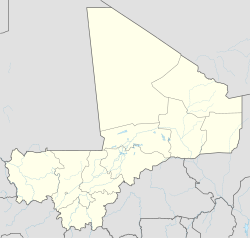Goundam
| Goundam | |
|---|---|
| Commune and Town | |
| Coordinates: 16°25′0″N 3°40′0″W / 16.41667°N 3.66667°WCoordinates: 16°25′0″N 3°40′0″W / 16.41667°N 3.66667°W | |
| Country |
|
| Region | Tombouctou Region |
| Cercle | Goundam Cercle |
| Commune | Goundam |
| Area | |
| • Total | 101 km2 (39 sq mi) |
| Elevation | 349 m (1,148 ft) |
| Highest elevation | 460 m (1,510 ft) |
| Lowest elevation | 260 m (850 ft) |
| Population (2009 Census) | |
| • Total | 16,253 |
| • Density | 160/km2 (420/sq mi) |
Goundam is a commune and town in north central Mali, in the Tombouctou Region. It is the capital of Goundam Cercle, one of five subdivisions of the Region. In the 2009 census the commune had a population of 16,253. The main ethnic groups are Songhay, Tuareg and Fulani.
The town is located on the Tassakan channel which runs west along the southern edge of the town center, draining from the Niger River (between October and January when it is in flood) towards the nearby Lac Télé which is approximately 4 metres below the level of the Niger. The Niger river town of Diré lies 35 km to the southeast, while Timbuktu is connected by highway 97 km to the east-northeast. Lac Fatil and Lac Oro lie to the southwest, near the Goundam Airport. Further north lies Lake Faguibine and to the south and west is the vast Niger inland delta, seasonal marshlands which feed the local lakes and rivers along this edge of the Sahara desert.
The town has a long history as a center for Songhay farmers and Bozo fishing communities, as well as settled elements of the semi-nomadic Fula, Tuareg and Maure peoples. Goundam was a city of the Songhai Empire, fell to the Moroccan invasion in 1591, and was later seized by Tuareg confederations from the northeast and the Fula of the delta region. Most powerful of these Fula states was the Macina Empire, centered to the southwest. The Toucouleur Empire conquered the area in the mid 19th century, and the French captured the town in 1894.
...
Wikipedia

